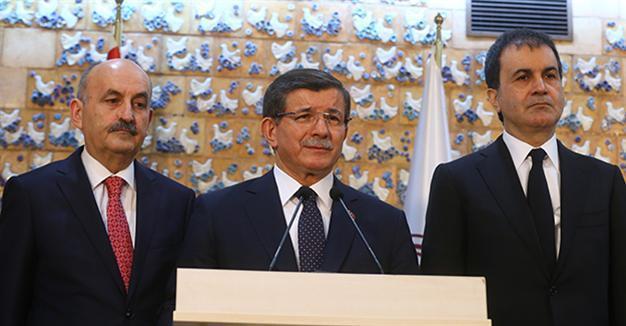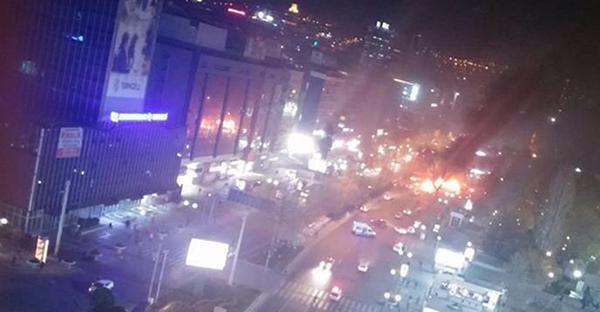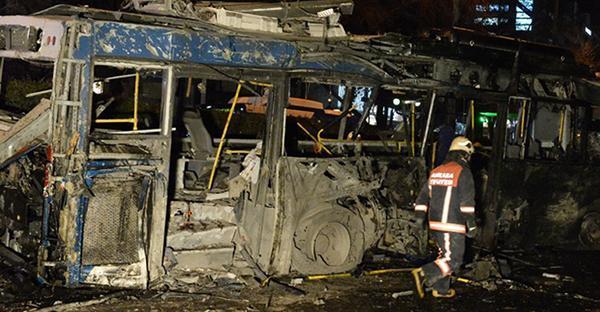Turkish PM: ‘Almost certain’ PKK behind Ankara attack
ANKARA

AA Photo
Findings point to the outlawed Kurdistan Workers’ Party’s (PKK) involvement in the March 13 Ankara attack “almost certainly,” Turkish Prime Minister Ahmet Davutoğlu has told reporters.So far 35 bodies have been identified, the prime minister said in a press conference on March 14, a day after a bomb-laden car killed at least 37 people in Ankara’s central Kızılay district. While the identities of the perpetrators remain unclear, Turkey’s interior minister said earlier in the day that “at least one” of the 37 bodies belonged to the attacker(s).
DNA investigations are ongoing after the blast, the prime minister added, saying 11 suspects have been detained over their suspected involvement in the attack.
Health Minister Mehmet Müezzinoğlu earlier said in a joint press conference with Interior Minister Efkan Ala and Justice Minister Bekir Bozdağ that at least 37 were killed while 125 wounded people were hospitalized after an explosion hit central Ankara on March 13.
A bomb-laden car caused the blast, Interior Minister Efkan Ala said at the same conference after a security meeting in Ankara.
Thirty people were killed at the scene of the incident while four others died on their way to hospital, Müezzinoğlu said, adding that at least one of the 30 was one of the assailants.
On March 14, the health minister announced that three more people had also succumbed to their wounds.
Nineteen people are in critical condition, while seven were in surgery, he said.
Ala said they would have more information about the perpetrators of the attack by March 14.
The area was evacuated as a precaution against a second attack.
The wounded were transferred to 10 different hospitals across Ankara, CNN Türk reported.
The blast took place where around 10 bus stops are located.
President Recep Tayyip Erdoğan, who was in Istanbul, was briefed by Ala about the blast on the phone, according to presidential sources. Erdoğan condemned the attack in a written statement, adding that “Turkey has become a target of terror attacks due to the instabilities in the region.”
Turkey will continue its determined fight against terrorism, he said.
“Terror attacks – which intend to target the integrity of Turkey, unity and solidarity of our people – do not diminish our will to fight against terror, but further boost it,” he added.
The Radio and Television Supreme Council (RTÜK) immediately declared a broadcasting ban on images of the scene and victims.
The United States had warned its citizens in a March 11 statement over a potential terror attack in Ankara.
“The U.S. Embassy informs U.S. citizens that there is information regarding a potential terrorist plot to attack Turkish government buildings and housing located in the Bahçelievler area of Ankara. U.S. citizens should avoid this area,” read the statement.
In a statement after the attack, the embassy said the source of the information in the warning was Turkish authorities and that it was a routine procedure.
“Last week, the U.S. Embassy became aware of threat information through a Turkish government warning circulating in social media. After confirming the warning with Turkish authorities, the embassy issued a notice to all American citizens in Ankara – both government employees and private citizens – and to Turkish employees of the U.S. Embassy, as we routinely do when we learn of Turkish government information about threats,” the statement read.

This is the third major blast to hit the Turkish capital since October 2015.
Islamic State of Iraq and the Levant (ISIL) militants bombed a peace rally near the Ankara Railway Station, leaving at least 103 dead on Oct. 10, 2015.
Four months later, a suicide car bomb attack targeted military shuttles in the city on Feb. 17, killing 29 people and injuring 81 others.

Turkey will develop a new security approach and mechanism for Ankara, Prime Minister Ahmet Davutoğlu said, following a nearly five-hour security meeting with senior officials on Feb. 20 in the aftermath of the Feb. 17 attack.
“Every province has special [security] needs,” the prime minister said, adding that Ankara had a special position as it was the capital hosting many government, state and opposition buildings, along with the envoys of many countries.
Elaborating on the new mechanism, Ala said technology would be used more in the implementation of the new security mechanism.
“That would be more prominent. Civil servants will be in official uniforms... Electronic devices will be used more,” Ala said Feb. 21.
The parliament building will also be surrounded by high-security metal fences.
“Every province has special [security] needs,” the prime minister said, adding that Ankara had a special position as it was the capital hosting many government, state and opposition buildings, along with the envoys of many countries.
Elaborating on the new mechanism, Ala said technology would be used more in the implementation of the new security mechanism.
“That would be more prominent. Civil servants will be in official uniforms... Electronic devices will be used more,” Ala said Feb. 21.
The parliament building will also be surrounded by high-security metal fences.
















